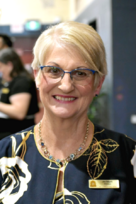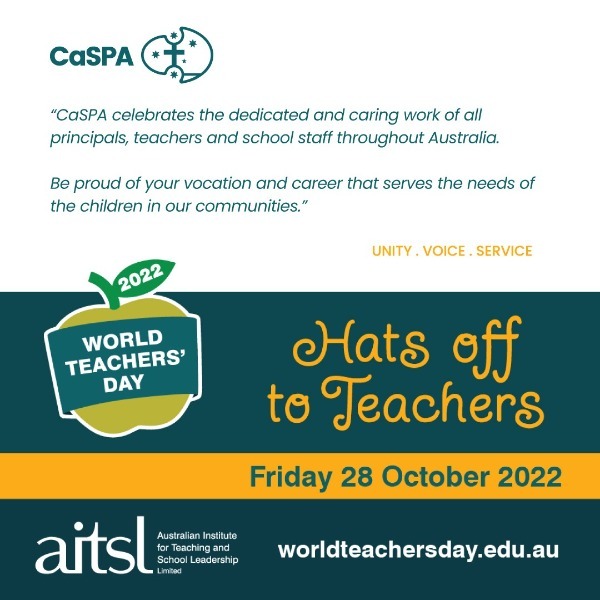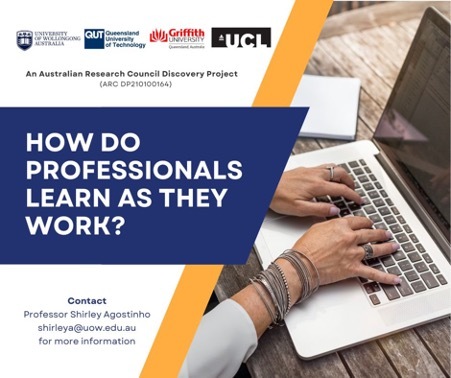November 2022 Newsletter
-
CaSPA Home Affairs Letter re Refugees 2022
-
President's Message
-
The School Photographer - Platinum Partner
-
CaSPA Latest News
-
NGS Super - Platinum Partner
-
CaSPA Board Update
-
World Teachers Day
-
Woods Furniture - Platinum Partner
-
NCEC 2021 Annual Report
-
Box Of Books - Platinum Partner
-
Media Release: NAPLAN National Report 2022
-
PSW - Platinum Partner
-
Article: What People Don’t Get About Being a Principal: Reflections From 3 Leaders in USA
-
Atomi - Gold Partner
-
Article: Schools should not have closed during Covid-19 pandemic
-
Rory's - Gold Partner
-
FujiFilm - Silver Partner
-
Reference Group Meeting
-
CCI - Silver Partner
-
CaSPA Professional Learning Scholarship 2023
-
Education Horizons - Silver Partner
-
CaSPA Social Action 2023
-
Notre Dame Australia - Master of Education
-
Australian Research Discovery Project
-
INSTALLING THE SZAPP
Dear Colleagues
I hope Term 4 is progressing well for you and that your community is enjoying the rites of passage for the Year 12 students. On behalf of the CaSPA Board I wish your students all the best in their final assessments and exams. I am sure that you are proud of your staff too and I hope you had a great day celebrating with staff on World Teachers’ Day.
At the meeting in September with Minister Clare, he asked for feedback and ideas for the status of our profession, concern about teacher workload, encouraging entry into the profession by incentives, and sought input into online learning. He also spoke about the findings of the recent productivity commission report released on 14 September. This report is at the link below and feedback is being sought by the Government.
https://www.pc.gov.au/inquiries/current/school-agreement/interim
The CaSPA Board met recently and discussed the issues raised by the Minister, which will be sent back to him and the Government. Some suggestions were: entrance requirements and pathways to teaching, higher salaries, provide more authorities to teach in the short term, national awards for teachers, more funding for education, bonded scholarships for ITE students and media promotion of the advantages of becoming a teacher.
As mentioned in the last newsletter, CaSPA has sent a letter to the Australian Catholic Bishops Conference (ACBC) to provide feedback about the Plenary Council. So far CaSPA has not received a response from the Australian Catholic Bishops Conference. However, CaSPA is aware of the letter being discussed in different states.
Recently on 19 October I represented CaSPA at the School Leadership and Teaching Expert Standing Committee (SLTESC) in Melbourne to discuss Australian Teacher Workforce Data (ATWD), Middle Leadership ( Project in Queensland at present), HALT process, and other topics including Disability Standards. An interesting statistic in the workforce data is that 26% of Secondary teachers are teaching out of expert field with it rising to 48% in the field of Industrial Technologies. We do have a problem – Maths is also very high out of teachers expert field.
Overall, this important work will no doubt be a great resource for the future of the teaching profession. Minister Clare has been informed by many aspects of AITSL’s work – it is a wholly owned company funded by the Commonwealth government. Its work program is set in accordance with directions from the Commonwealth Minister for Education.
Australian Education Research Organisation (AERO) has also been publishing findings recently which may be of interest to you: https://www.edresearch.edu.au/.
Lastly, it is my pleasure to inform you that CaSPA is preparing for a Special General Meeting on 8 December 2022 to approve a new Constitution for the Association. There will not be any substantial governance changes but the Board decided earlier this year that it was time to update the language and concepts to be more contemporary. This will also ensure being compliant with ASIC requirements. The updated version will also enable CaSPA to continue its status as a Charity with the ATO.
I trust Term 4 will go well for you and your community.
Blessings to all
Ann Rebgetz - President
- Continuing liaison with Miriam Rose (Northern Territory) to create the First Nations artwork commissioned by CaSPA.
- CaSPA Strategic Plan 2023 – 25 approved by the Board and is now being prepared for publishing.
- Board Zoom Meeting held on 20 October.
- CaSPA Special General Meeting confirmed for 8 December to approve the new CaSPA Constitution.
- CaSPA Meeting Calendar for 2023 being drafted.
- As a member of the Coalition of Australian Principals (CAP), CaSPA liaised with School TV’s media production with Dr Michael Carr-Gregg and current Principals form the 3 sectors of education in Australia. Video should be released soon.
- Continuing liaison with Miriam Rose (Northern Territory) to create the First Nations artwork commissioned by CaSPA.
- CaSPA Strategic Plan 2023 – 25 approved by the Board and is now being prepared for publishing.
- Board Zoom Meeting held on 20 October.
- CaSPA Special General Meeting confirmed for 8 December to approve the new CaSPA Constitution.
- CaSPA Meeting Calendar for 2023 being drafted.
- As a member of the Coalition of Australian Principals (CAP), CaSPA liaised with School TV’s media production with Dr Michael Carr-Gregg and current Principals form the 3 sectors of education in Australia. Video should be released soon.
Profiles of all the CaSPA Board are available on the CaSPA Website: https://caspa.schoolzineplus.com/current-and-past-board-members
- Gregory Spears is principal of Blow Pierce Campus, Friendship Public Charter School, Washington, D.C.
- Annette Sanchez, principal, Hampton-Moreno-Dugat Early Childhood Center in Beeville, Texas
- Evelyn Edney is principal of Early College High School, Delaware State University in Dover, Del.
What inspired you to become a Principal?
Sanchez: When I was young, I loved my principal. She was visible. I remember her walking down the hallway, and I’ll never forget what she told me and what I tell my students now. I knew when I was young that I wanted to be a teacher, just because I had wonderful teachers and that was just my thing. My parents had been teachers. I remember her saying, “You know what, a principal would be a wonderful job because the principal teaches the teachers, who help the students. It would be great for you to be a principal.”
Edney: Looking back, I think it was just that I felt like I could affect more change in a bigger classroom. You’re essentially still a teacher, and your classroom is a little bigger, and you’ve got a whole school with you. When I was younger, I was the poor kid. My mom worked three jobs to get me through a Catholic School. They and my mom are probably the reason why I did go into education to begin with. They made me love school. The climate was there; it was very nurturing, very caring. They did not treat the poor kid like the poor kid. I don’t tell people I’m going to work every day. I say I’m going to school. It’s just different. They taught me the lesson of belonging to a school, instead of just attending one. When you attend, you get up, you go to school, you do your work, and then you come home. But if you belong, you get involved, and when you get involved, you become really connected to school, and it makes you want to learn.
What’s the most widely held misconception of the job?
Sanchez: I think that a lot of people don’t view the principalship as a teaching position. They think [of] this person who’s doing budgets, or working on policy, where in reality a principal is a teacher. And that principal leads the curriculum, they lead the teaching, and then they lead the school culturally. Principals have a huge impact on learning and supporting teachers. As principals, we have the ability to open the doors to all learners. I’ve really learned that principals and leaders grow leaders.
Edney: When I was that young teacher, I didn’t like the administration. I thought they were just being hard on us, not allowing us to do anything. But as you get older, you see that sometimes … your world is a part of [their world]; it isn’t the whole thing. Your job as a leader is to see the vision of everything, all working together.
Spears: I also think when people think about the principal or the principalship [they think of] you sitting in an office, being in meetings all day, kind of delivering orders or directives from on high, when to be an effective principal you have to be involved in everything that’s happening in your building.
I want their first experience in school to be wonderful, so that it can follow them. I think that’s sometimes the biggest misconception of a principal, even though we like to say we’re essentially the mayors of a small city. It’s not enough to just be a decisionmaker or the person at the top. You have to be involved in every aspect of school culture, both academically and in the school environment, to really make sure you are creating an effective space for teaching and learning to occur and also one that students and staff and families want to continue to come back to.
How has the job changed since you started as a principal?
Sanchez: We used to not focus so much on social-emotional [learning], and because of [COVID] we now see the effects of social-emotional support for kids. That’s changed. We need to make sure we’re hitting the social-emotional learning [piece] and focus on diversity and equity in the classroom. I think that we’ve learned that that propelled students forward. Time on the job. I remember when I first started, in the smaller school district, I would get to work, I would go home. But now, it’s a big after-hours job. We have students starting earlier, and we also have after-school duty. We have after-school, where kids get dinner at school. There are kids who get here at 7 a.m., and don’t leave to go home until 6:30 p.m. Time with kids has expanded the day—which I think is great for learning and kids who need it.
Prior to COVID, parents were invited into the school. The teachers knew the parents very well because the parents would come pick up their child. But now we are a closed campus. Most school districts have [become closed campuses] because of things that have happened, not only with COVID, but with safety. Here in Texas, we had that huge tragedy [in Uvalde], but I know it’s happened in other states. That’s made us a closed campus. It puts a little disconnect between the teaching world and the parent world because, while parents might see emails or they might visit a teacher via Zoom, they don’t have that closeness with the school that ultimately affects this connectedness to the school.
Edney: There are a lot more legislative things that are affecting schools. I know the government needs to regulate some things, but it’s hard when there are mandates sometimes, and then you must come up with a magic wand to pay for everything. There are never enough hours in our day. We try to cut it off at a certain point on the weekends to decompress and to press reset. I even put up an out-of-office reply to say “Happy Weekend. I am enjoying my off-screen time. I may not get to your email until after the weekend, and I hope that is OK.” Because people will literally email you at all times of the day or night. There are always text messages, and at some point, you have to make sure your own life is taken care of.
I do sleep—people think I don’t sleep because I come to school very early. But I come to school very early because no one will answer an email at 4:30 in the morning. I get a little caught up, and when the students and the teachers come walking in that door, I need to be ready for them. It’s hard to get work done and be there for everybody at the same time, so that’s a demand that’s hard to keep up with sometimes. If you’re not careful, it will burn you out very fast.
Spears: One of the biggest changes coming out of the pandemic is that we can’t recreate what we had. We must build something new. We must build something better. I think there is a heightened sense of responsibility, just looking nationally at where students were pre-pandemic [academically] and where they are now. When you look at different assessments ... there is a heightened responsibility to make sure that what we are doing is helping students get what they need and [understand] why some of those needs may be greater post-pandemic.
What experience will stay with you long after you’ve retired?
Edney: It’s not so much a moment, but things that occur. Being a principal, I’ve had a lot of assistant principals who’ve worked under me, and every single one of them has moved on to become a principal or a superintendent, or something else, and they are still in education. That’s exciting for me. I feel like that’s great because my classroom got bigger and I am still teaching people, and I love that part.
Spears: If you are not finding things on a daily basis as a school leader or an educator in general that kind of move you to laugh, to tears almost, that inspire you, then I am not quite sure what it is that you are doing. You always get that clichéd question as an educator: “Who is your favorite teacher, who inspired you?” For me, the answer is the teachers I have in my building right now. I can go into a classroom and be inspired each and every day.
[When school reopened during the pandemic] students wanted to come up and hug you. Just hugging students and seeing the excitement on their faces, the smiles, the happiness and the joy to be back in this space—I don’t think that will ever go away for me, to be honest.
What keeps you going?
Sanchez: The students keep me going. You’re a superhero in their eyes, and I think they need to know that superheroes aren’t always fictitious, that there are superheroes within their schools, superheroes within their communities. The kids are just genuine, and they’ll tell you the whole truth. I remember Gabby—Gabriela—in school, and I’m thinking that I want them to remember me. I want to make an impact, like “Hey, my first experience in school was the best experience.” I have an early-childhood campus, so I want their first experience in school to be wonderful, so that it can follow them.
Edney: The kids, the teachers. I love school. I absolutely love school. I tell people I’ve been in school since 1972—that’s when I started Head Start, a million years ago—and I love it so much I never left it. I don’t tell people I’m going to work every day. I say I’m going to school. It’s just different. I love the ‘living being’ that is a school and [everything] that’s inside of it: all the students, the teachers, the parents, everything—the whole ball of it all, the ceremony of it all, the traditions, the homecomings, the proms. I love seeing kids grow as leaders—or they started off kind of a little bit immature, a little edgy, but they eventually do mature. In my school system, my students take classes at Delaware State University, so to sit there and see students earn college credits sitting next to bearded people, it’s such a joy.
Spears: For me, this job isn’t a stepping stone to a district position or a community office position. This is kind of the end of the road for me. It’s what I aspired to be. My reason for wanting to get into leadership was to have a broader impact on the students and staff. There are new challenges each and every day: finding ways to keep veteran teachers invested and to help them continue to grow, figuring out how to grow the capacity of new teachers and newer staff members. This is difficult work, but if you can’t find the why, if you can’t find your inspiration, if you can’t find that person or that group or that thing that continues to bring you back, then this really isn’t the work for you.
(Source: EducationWeek)
by Brett Henebery 21 Oct 2022
State and territory governments strayed from health and pandemic planning advice by closing schools for entire terms, a major review into Australia’s pandemic response has revealed.
The independent review, led by Western Sydney University chancellor and former top public servant Peter Shergold, found that women were particularly disadvantaged by the decision.
“Schools should have stayed open. For children and parents [particularly women], we failed to get the balance right between protecting health and imposing long-term costs on education, mental health, the economy and workforce outcomes,” the review said.
“Women were over 30 per cent more likely than men to leave the workforce in the first months of the COVID-19 pandemic. They were more likely to lose pay, burn through leave and fall behind on savings and superannuation.”
Shergold and the other panel members added that state leaders “insisted on going their own way, emboldened by their constitutional prerogatives”.
A number of studies conducted throughout the pandemic found that most schools struggled with higher workloads and student mental health issues as communities sought to get a grasp on the complexities involved with remote learning.
Earlier this year, a nationwide study by Orygen and Mission Australia found that of the more than 3,000 young people who rated their mental health and wellbeing as poor, over three quarters (76.5%) indicated the pandemic had a negative impact on their mental health.
A separate study published this month by Macquarie University and the University of Wollongong found that some teachers worked 15 hours or more a day on average, and were “expected to be online 24 hours a day” to respond to students, parents, caregivers, and the school executive.
The pandemic’s silver lining for schools
New research, conducted by Monash University’s School of Curriculum Teaching & Inclusive Education, examines what the disruption taught Australia’s teachers, and how that will positively impact their teaching practice in the future.
Lead author, Professor Umesh Sharma, said though the COVID-19 pandemic has presented extraordinary hardships in virtually every aspect of life, it has also provided opportunities for growth and improvement, and education is no exception.
“School leaders always play an important role in supporting their staff. During difficult times, such as COVID-19, their role becomes even more important to protect their staff from burnout and proactively supporting them,” Professor Sharma told The Educator.
“What we found in this study is that leaders across the schools were consistent in key practices/strategies they employed in creating an environment where the staff felt that they were not on their own in this difficult journey.”
Professor Sharma said the staff felt that whenever someone was feeling low, there was someone else in the school who would lift them up.
“School leaders can create a collective and supportive culture where everyone feel supported by forming small teams and providing resources needed for the team to function well; empowering the team to make decisions and trusting their judgments; and providing them extra time for planning.”
(Source: The Educator)
To understand how professionals use digital technologies to work and continually learn .
Australian Research Council Discovery Project
Digital technologies are changing the way teachers do their work and learn as they work.
But not much is known about this.
We want to find out how you learn as you work. We invite you to complete an anonymous online survey (10-15mins of your time).
Your responses are important to us!












